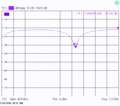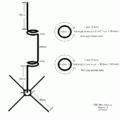Accessories:G7RGQ Omni Directiona Antenna: Difference between revisions
imported>Beastadmin Created page with "For a long time, until I got the russian wonder, I was using this [http://www.kineticavionics.co.uk/forums/viewtopic.php?f=1&t=7489&sid=a97d41478e66511dd5cf715ee7c88df0&start=..." |
imported>Beastadmin No edit summary |
||
| Line 1: | Line 1: | ||
For a long time, until I got the russian wonder, I was using this [http://www.kineticavionics.co.uk/forums/viewtopic.php?f=1&t=7489&sid=a97d41478e66511dd5cf715ee7c88df0&start=24 antenna] but with quarter wavelength radials only. Don't know what the author hopes to gain from longer ones, within 30 years of ham radio life I never saw radials different to half wavelength. I have measured one on a network analyzer. If you leave the antenna rod in free space (as in the picture below), make the top section about | For a long time, until I got the russian wonder, I was using this [http://www.kineticavionics.co.uk/forums/viewtopic.php?f=1&t=7489&sid=a97d41478e66511dd5cf715ee7c88df0&start=24 antenna] but with quarter wavelength radials only. Don't know what the author hopes to gain from longer ones, within 30 years of ham radio life I never saw radials different to half wavelength. I have measured one on a network analyzer. If you leave the antenna rod in free space (as in the picture below), make the top section about 2 mm longer, if you put a 20 mm plastic tube over it, shorten the top section by 5mm. I do not know the influence of a wide diameter (50 mm - 100 mm) plastic tube, maybe this is then just matching the given length. | ||
<gallery> | <gallery> | ||
| Line 9: | Line 9: | ||
Click on the pictures for higher resolution (drawing from orignal web page, in order to copy before it disappears there) | Click on the pictures for higher resolution (drawing from orignal web page, in order to copy before it disappears there) | ||
A final note for manufacturing: Take a long wire and put markers for the sections on it: | A final note for manufacturing: Take a long wire and put markers for the sections on it: 136 mm -> 65.5 mm -> 205 mm -> 65.5 mm -> 190 mm. | ||
Then first roll the inductors (1.5 turns onto a 9. | Then '''first''' roll the inductors (1.5 turns onto a 9.5 mm drill) and '''second''' do the 90° bends in order to get it straight. | ||
Another good antenna, which is easy to build (you may leave away the loop with acceptable degradation) can be found on [http://www.lll.lu/%7Eedward/edward/adsb/antenna/ADSBantenna.html Edward's page]. | Another good antenna, which is easy to build (you may leave away the loop with acceptable degradation) can be found on [http://www.lll.lu/%7Eedward/edward/adsb/antenna/ADSBantenna.html Edward's page]. | ||
Latest revision as of 18:36, 10 November 2013
For a long time, until I got the russian wonder, I was using this antenna but with quarter wavelength radials only. Don't know what the author hopes to gain from longer ones, within 30 years of ham radio life I never saw radials different to half wavelength. I have measured one on a network analyzer. If you leave the antenna rod in free space (as in the picture below), make the top section about 2 mm longer, if you put a 20 mm plastic tube over it, shorten the top section by 5mm. I do not know the influence of a wide diameter (50 mm - 100 mm) plastic tube, maybe this is then just matching the given length.
Click on the pictures for higher resolution (drawing from orignal web page, in order to copy before it disappears there)
A final note for manufacturing: Take a long wire and put markers for the sections on it: 136 mm -> 65.5 mm -> 205 mm -> 65.5 mm -> 190 mm. Then first roll the inductors (1.5 turns onto a 9.5 mm drill) and second do the 90° bends in order to get it straight.
Another good antenna, which is easy to build (you may leave away the loop with acceptable degradation) can be found on Edward's page.


